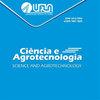Proline and sodium nitroprusside increase the tolerance of Physalis peruviana L. plants to water deficit through chemical priming
IF 0.9
4区 农林科学
Q2 AGRICULTURE, MULTIDISCIPLINARY
引用次数: 1
Abstract
ABSTRACT Water deficit is the main cause of abiotic stress to which plants are susceptible, whether cultivated or those that are underexploited, such as Physalis peruviana L. Searching for tools that contribute to the management of water deficit in plants is fundamental for the maintenance of agriculture, especially in arid and semi-arid areas around the world. Thus, the objective of this study was to evaluate the effect of chemical priming with proline and sodium nitroprusside as promoters of increased tolerance to water deficit in P. peruviana plants. Plants grown under well hydrated conditions (FC of 70±5%) were sprayed with proline (10 and 20 mM) or sodium nitroprusside (25 and 50 μM) and evaluated after exposure to water deficit (FC of 20±5%). Plants cultivated under water deficit without pretreatment showed reductions in the variables of water relations, gas exchange and growth. Proline and sodium nitroprusside were effective in maintaining less negative water potential, contributing to improvements in gas exchange, such as CO2 assimilation, stomatal conductance and transpiration. Thus, it was possible to measure greater tolerance to water deficit in pretreated plants and, consequently, greater biomass accumulation. It appeard that pretreatment of proline and sodium nitroprusside can have a priming effect against water deficit in P. peruviana plants.脯氨酸和硝普钠通过化学诱导提高了绒棉植株对水分亏缺的耐受性
水分亏缺是植物易受非生物胁迫的主要原因,无论是栽培植物还是未充分利用的植物,如秘鲁Physalis .寻找有助于管理植物水分亏缺的工具是维持农业的基础,特别是在世界各地的干旱和半干旱地区。因此,本研究的目的是评价以脯氨酸和硝普钠为促进剂的化学诱导对紫杉树耐缺水的影响。在水分充足(FC为70±5%)条件下生长的植株分别喷洒脯氨酸(10和20 mM)或硝普钠(25和50 μM),并在水分亏缺(FC为20±5%)条件下进行评价。在水分亏缺条件下栽培的植物,其水分关系、气体交换和生长指标均有所降低。脯氨酸和硝普钠能有效维持较低的负水势,有助于改善二氧化碳同化、气孔导度和蒸腾等气体交换。因此,有可能测量到预处理植物对水分亏缺的更大耐受性,从而获得更大的生物量积累。提示脯氨酸和硝普钠预处理对紫杉树水分亏缺具有启动效应。
本文章由计算机程序翻译,如有差异,请以英文原文为准。
求助全文
约1分钟内获得全文
求助全文
来源期刊

Ciencia E Agrotecnologia
农林科学-农业综合
CiteScore
2.30
自引率
9.10%
发文量
19
审稿时长
6-12 weeks
期刊介绍:
A Ciência e Agrotecnologia, editada a cada 2 meses pela Editora da Universidade Federal de Lavras (UFLA), publica artigos científicos de interesse agropecuário elaborados por membros da comunidade científica nacional e internacional.
A revista é distribuída em âmbito nacional e internacional para bibliotecas de Faculdades, Universidades e Instituições de Pesquisa.
 求助内容:
求助内容: 应助结果提醒方式:
应助结果提醒方式:


